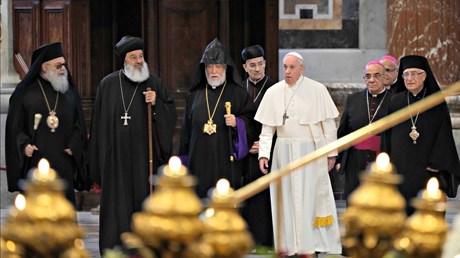Visiting the Vatican for a Christian summit, leaders explain why the problems of sectarian politics have become unbearable.

Pope Francis has a message to consider from Lebanon’s evangelicals.
“We are not comfortable in our sectarian system, and thank God that we are not a part of the politics that led the country to collapse,” said Joseph Kassab, president of the Supreme Council of the Evangelical Community in Syria and Lebanon.
“We are not benefiting, and it hurts us like the vast majority of the Lebanese people.”
Last week the Catholic pontiff invited Lebanon’s Christian denominations to the Vatican for a time of prayer and reflection. Ten patriarchs, bishops, and church leaders gathered, as Francis encouraged them to speak with one voice to the politicians of their nation.
Lebanon has been unable to form a new government since its prior one resigned 11 months ago, following the massive explosion at Beirut’s port. As its Christian, Sunni, Shiite, and Druze political parties wrangle over representation, more than half the population now falls below the poverty line.
Following a default on national debt, personal bank accounts have been largely frozen as the Lebanese lira has lost over 90 percent of its value. The World Bank estimates the economic collapse to be among the world’s three worst in the last 150 years.
“We blame and condemn our Christian and Muslim political leaders equally,” said Kassab.
“We have to say this loudly.”
The nation’s longstanding sectarian system, however, works to recycle these leaders. Lebanon’s president must be a Maronite Christian, its prime minister a Sunni Muslim, and its speaker of parliament a Shiite Muslim.
The 128 parliament seats are divided evenly between Muslims and Christians, with one reserved for Protestants. But confessional ...
from Christianity Today Magazine
via


.gif)

.gif)
.gif)
